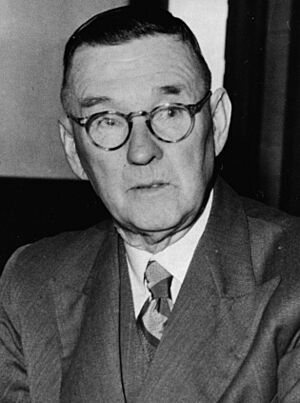Frank Arthur Cooper facts for kids
Quick facts for kids
Frank Cooper
|
|
|---|---|

Cooper as Treasurer in 1940.
|
|
| 25th Premier of Queensland Elections: 1944 |
|
| In office 16 September 1942 – 7 March 1946 |
|
| Monarch | George VI |
| Governor | Leslie Wilson |
| Deputy | Ned Hanlon |
| Preceded by | William Forgan Smith |
| Succeeded by | Ned Hanlon |
| 29th Treasurer of Queensland | |
| In office 12 April 1938 – 27 April 1944 |
|
| Premier | William Forgan Smith |
| Preceded by | William Forgan Smith |
| Succeeded by | Ned Hanlon |
| Member of the Queensland Legislative Assembly for Bremer | |
| In office 22 May 1915 – 12 March 1946 |
|
| Preceded by | James Cribb |
| Succeeded by | Jim Donald |
| Personal details | |
| Born |
Frank Arthur Cooper
16 July 1872 Blayney, New South Wales Colony |
| Died | 30 November 1949 (aged 77) Kedron, Queensland, Australia |
| Nationality | Australian |
| Political party | Labor |
| Spouse | Agnes Maisie Hardy |
| Occupation | |
Frank Arthur Cooper (born 16 July 1872 – died 30 November 1949) was a very important politician in Queensland, Australia. He served as the Premier of Queensland, which is like the leader of the state government, from 1942 to 1946. He was a member of the Labor Party.
Contents
Early Life and Work
Frank Cooper was born in 1872 in a place called Blayney, New South Wales. His father was a miller from England, and his mother was from Ireland. Frank went to school in Sydney.
After school, he worked as a clerk in different places around Sydney. He even worked for a company that made brakes for trains. This job took him to different parts of Australia. Eventually, he settled in Ipswich, Queensland, where many railway workshops were located.
Getting Involved in Workers' Rights
In Ipswich, Frank Cooper became very interested in helping workers. He joined a union, which is a group that supports workers' rights. He also became involved in politics with the Labor Party. He helped lead groups that worked for better conditions for workers, like the eight-hour day movement, which aimed for a shorter workday.
Because he supported workers' strikes in 1912, he lost his job. After that, he became a journalist and continued to fight for workers' rights. He became the editor of a newspaper called Queensland Leader, which was a publication for workers in Ipswich. He worked there from 1915 to 1925.
Starting a Political Career
In 1915, Frank Cooper was chosen to run for a seat in the Queensland Parliament. He won the election for the area called Bremer, which was based in Ipswich. He held this important job for 30 years!
In 1924, he also became a local council member in Ipswich and later became the deputy-mayor. The next year, he married Agnes Hardy.
Rise to Leadership
Frank Cooper quickly became a respected member of the Labor government in Queensland. Even when the Labor Party was not in power, he was known as a strong speaker and a good politician.
Important Government Roles
When the Labor Party returned to power in 1932, Frank Cooper became the Assistant Treasurer and the Secretary for Public Instruction (which is like the Minister for Education). By 1938, he was the Treasurer, in charge of the state's money. He did a great job, and that year, Queensland had its first budget surplus since 1927. This means the government had more money than it spent.
From 1940 to 1942, he was the Deputy Premier. This was a very important time because World War II in the Pacific was starting. Frank Cooper played a key role in getting Queensland ready for the war, making sure the state had the resources and plans needed.
Premier During World War II
In 1942, Frank Cooper became the Premier of Queensland. This happened during World War II, which was a very challenging time. The national government, led by Prime Minister John Curtin, changed how taxes were collected. This meant the states would no longer collect their own income taxes.
Leading During Wartime
Even though he was in his seventies, Premier Cooper was very energetic. He strongly supported Australia's efforts in the war and worked closely with Prime Minister Curtin. He led Queensland through the rest of the war and for the first few months of peace.
In 1946, he decided to retire from politics. Edward "Ned" Hanlon, who had been the Treasurer, then became the new Premier.
Later Life
After leaving Parliament, Frank Cooper remained active in his church and with the University of Queensland. He passed away at his home in Kedron, a suburb of Brisbane, in 1949. He was given a special state funeral, which is a public ceremony to honor important people.

